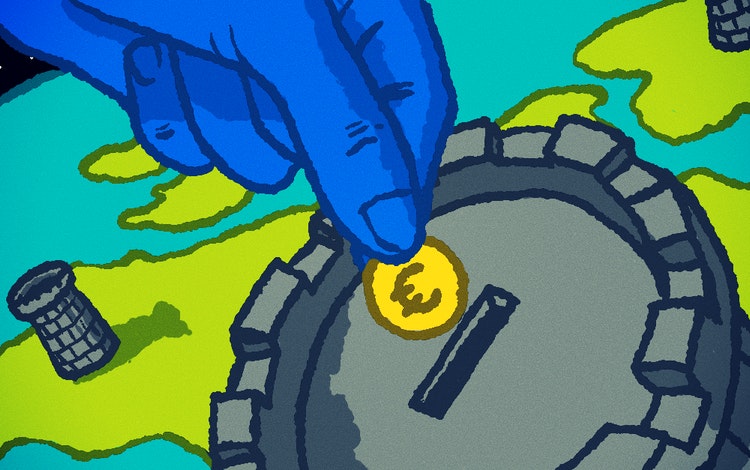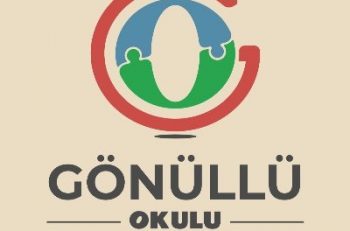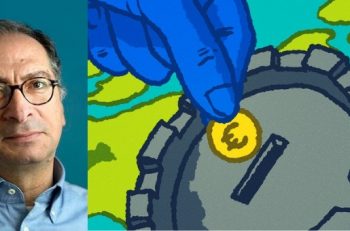‘Funds Used in Compliance with Principles and Values Do Not Harm the Civility of NGOs’

Discussions on the use of funds by civil society continue. Sunay Demircan, an experienced name in the field of civil society, who is the first of the experts whose opinions we consulted, states that the issue of using funds by NGOs should be avoided from the paranoia of “treason”, and that it should be seen and evaluated in a multidimensional way. According to Demircan, there is no ethical problem in the transparent use of funds, which act as a locomotive in the development of civil society and the attainment of rights in Turkey.
High on Turkey’s agenda for the last few days: Some media outlets were reported as ‘fund-isan media’ because of the grant they received from the US-based Chrest Foundation, and then President Recep Tayyip Erdoğan and Director of Communications Fahrettin Altun’s made statements regarding a new regulation in the media.
In an interview, President Erdoğan stated that ‘he sees fake news as an equal to terrorism and a clear threat to democracy’ and announced that with the opening of the Parliament in October, a new study will be conducted in addition to the Social Media Law, which includes traditional and social media.
In addition to Erdogan’s statements, Fahrettin Altun said that they would not allow ‘fifth column activities under new guise’ and noted that ‘there is a need for a regulation for media organizations operating in our country with the funds of foreign states or institutions’.
After this statement, in response to the discussions about foreign funding in the media, Radio and Television Supreme Council (RTÜK) stated that ‘regulation and supervision activities are carried out meticulously’ regarding the media organs operating in Turkey with the funds of foreign institutions and organizations, and said, ‘Our domestic and national media are not isolated and unattended.’
These discussions, which focused on the media, were also reflected in the civil society. Since the 1990s, accusations such as ‘espionage and treason’ have been on the agenda from time to time, especially against NGOs using foreign funds from the West in civil society in Turkey. In the current debate on institutions using Western funds, which started through Medyascope and the media, some media outlets question the sincerity of bringing the ‘foreign funding’ polemic to the agenda, recalling ‘some NGO projects and news-comment sites that continue their activities with the support of Qatar or Islamic Development Bank funds.’
We talked to Sunay Demircan about the use of domestic and foreign funds in the civil field, its effects on civil society, the separation of funds from the West and the East, and more.
Is there any drawback to the civil society’s civility and independence in NGOs to receive funding from foreign organizations? Does using funds harm the ‘civility’ of civil society?
‘What should we understand from civility and the independence of civil society?’ I would like to explain this first. First of all, we need to briefly define the concept of civil society. The concept, namely civility, comes to us from Rome. Civil society is a civilization and a whole of relations, with the reinterpretation of concepts such as mind, will and rights, whose foundations were laid in Rome, with the law protecting the rights of the individual in the duality of the individual-state, and the law entering into daily life, and the private space becoming a category separated from the public space by law. This is how the civility begins to form.
We call the organized structures in the civil field as NGOs, that is, non-governmental organizations. There are certain criteria for the independence and civility of NGOs: What is an NGO? The society should be independent from the state and the private sector we call the market. NGO must be autonomous, democratic, and transparent.
These are undoubtedly internationally known concepts. In my opinion, civil society exists with values and the level of meaning that is built on the bonds produced by values, that is, relations. Of course, the language that carries this meaning is also important.
In my opinion, the main problem faced by civil society all over the world today is the erosion of values over time and the breaking of ties, the collapse of the meaning plane based on ties and values. People are looking for meaning, but they can’t find it. Think about it, people need people, but we have forgotten this state of neediness. We are drifting towards a void and as a result, we express this state of ours with an extremely tense, angry, and pushing language.
Immediately the label is ready, ‘traitor’. It shouldn’t be this easy to say, right? The name is obvious, it is stated in a transparent way, there are no secrets. You can say ‘I don’t support this’, ‘I don’t agree’ and ‘I condemn’, but don’t say ‘traitor’.
In conclusion, ‘does using funds harm the ‘civility’ of civil society?’ My answer to the question is: This is a cutting-edge situation. It is not correct to say ‘it does’ if the relationship between the giver and the recipient is transparent and controllable, complies with the current laws, coincides with the basic principles and visions of the institutions, and is managed according to the criteria of civility within the framework of the above definitions. But if it does not comply with them, and there are many examples of this, then of course it does.
‘Resources Aren’t Just Money’
How should we evaluate the resource-fund?
The resources are not just money. In fact, money is only a small part of the resources. In my opinion, all values, abstract, concrete, direct, indirect, small, and large, are sources for NGOs. The name, logo, information produced and shared by the organization, experiences and experts are also sources. Therefore, the existence of a non-governmental organization is a resource in itself, and from this point of view, I think the future dream of an organization should be to become a resource. So, we must get out of this resource equal fund, fund equal money equation, it’s a closed loop.
Do NGOs get only financial support as a funding? Using an example, how would you describe the process of a non-governmental organization receiving funding from a foreign or domestic source and its effect on its independence?
An NGO constructs its relationship with the resource within the framework of its principles, purpose of existence and needs. In the search for resources, it is important to have ‘resource management’ principles that do not pose a threat to their independence and civility. Especially in this period, I think that the source should be questioned much more carefully. Not only in terms of origin, but also in terms of the reality and suitability of the need.
Do foreign organizations also provide resources other than funds?
Of course, let me give an example right away. This is a good question that can also clarify the issue of ‘the traitor who establishes relations with a foreigner’. In the 90s, I was working in a very active nature protection organization (association) working on a national scale, the state tried to build a dam on Fırtına Creek and gave the job to a company. We also campaigned to ‘do not build this dam, protect Fırtına’. One day, there was a knock on our door, we saw that a gentleman is the owner of the company that will build the dam, he offers us cooperation, he says, let’s make a project, we will give financial support, and he offers a serious amount of money.
He doesn’t say, ‘When you get this money, you will put an end to your objection to the dam. What will you do? Is the source local? Local. Is it legal? Legal. Does it interfere with my independence? No.
But there is one thing that is wrong, and that is the ‘ethical rule’. In other words, the conscience of the organization tells you to ‘stop’. Of course, we did not receive the money, thanked, and sent it back, then we filed a lawsuit, but we also needed a scientific report for the court, we couldn’t find an expert on river-type fluid power plants in Turkey at that time, we applied to an organization that provides funds for such matters from England and we were contacted by an expert on the subject from England. A hydrologist was sent. Look, there is no money, they just paid the expenses of the expert, the expert came, worked, prepared the report, we presented that report to the parties, the campaign was successful, and the managers of the time said, ‘Fırtına will be protected, the dams will be cancelled’.
Now, it depends on how you look at the situation, there may be people who say, ‘that dam should have been built, you came with the money of the British, you brought trouble on us, traitor’ (but please don’t say that). Some may say, ‘Let there be an untouched river in this country, God bless you’.
So, you are saying that it is more important that the support is in line with your principles and needs, rather than it is being foreign?
Of course. Saying ‘We don’t want the foreigner or his money’ is not a sentence to be used everywhere. Sometimes that unpopular foreigner contributes more to your country than you do. An Englishman named Davis came to Turkey in the 1960s, he found his own source, stayed for years, and deducted Turkey’s flora. 10 volumes and eight thousand something species. The man is gone, and we were able to add only one volume afterwards. Then he established a foundation in England to support such studies.
Archeology is also like that, isn’t it? The foreigners extracted almost all the historical values of the country, from Göbeklitepe to Çatalhöyük, from Ephesus to Troy. As far as I know, foreign teams are still digging 30-odd areas with foreign funds. What shall we say now? ‘They’re thieves, they should leave’? We even learned the value of the sand dunes of the famous Salda Lake from NASA. Of course, I don’t say ‘Oh, we’re done without foreigners, we’re burnt out, I’m glad they exist’, I just want to point out that cooperation in every field is inevitable and it’s meaningless to declare those who cooperate as traitors.
‘Using Domestic or Foreign Funds Does Not Harm Civil Society If It Is Not Against Principles and Values’
In other words, do we say that ‘using domestic or foreign funds and resources will not harm the civility of civil society if it is not contrary to its principles and values’?
Let’s let the members and managers of that organization decide on the civility of that organization. We love judging and executing people. For example, EU (European Union) funds. There are many people who use them, and thanks to those funds, very important works have been done and are still being done. EU supports paved the way for freedoms in many issues and served as an engine in Turkey. For example, if progress has been made in gender equality issues, EU funds and women’s organizations have a great impact and effort. The same is true for disability rights. Thanks to EU funds, many non-governmental organizations in Turkey became aware of each other, experienced campaigning and creating new collaborations.
EU funds played an important role in paving the way for fundamental rights and freedoms in Turkey.
Significant changes in the constitution and laws in Turkey were achieved because of the gains made in the EU harmonization process and the efforts of NGOs. Therefore, it is very wrong to say that they ‘sold the country’. If the NGO is meticulous and transparent when receiving funds, gives account of the funds it receives to its members and supporters, complies with the law, and shows ethical rigor, there should be no problem.
What would you say about the fund recipient and fund giver relationship? Does the fund recipient come under the domination of the funder? What happens when you get funding? Can you explain the logic of the fund?
There are three parties: the funded, the funder and the supervisor. The resource can be in-kind or financial. All three parties have their own principles and regulations. The funder says, ‘You can spend the fund under the following conditions, and you will report the results to me, and I will monitor you to see if the support I have given is used in that direction’. But it does not say ‘I will supervise all your affairs; I will interfere with your management’. In the course, then there is no independence of the institution. The sponsor gives the recipient an instruction on how to use the support. In this directive, the conditions of the sponsoring institution are specified, these may vary for each funding institution, this is normal because that institution also provides support within the framework of its own existence principles. If the demands set by the supporter’s directive do not coincide with the principles and values of the receiving party, it will not accept them and will not use the fund. If it still accepts it, this is undoubtedly a rough situation. Saying, ‘It does not matter as long as it’s money’ also tarnishes the prestige of the civil sphere. It is natural for civility to have problems, just like every other field.
Here, the main controlling party is the public authority over the existing laws and the public vote regarding the use of that support. Let’s say an association received a grant and used it for a campaign, the parties to the problem that the campaign is interested in should supervise this process, be a part of the work, and actively participate. Otherwise, the association received its support, they came from Istanbul, stayed for two days, finished the job, and came back, the participation of the locals was a bit of a show. Of course, there are cases like this, the parties that were made a part of that process should check and question it, ‘you are doing this but why don’t we know?’ they should say. Civility is not only the work of the organization, but also its stakeholders must be a part of the civil mind and solutions so that we can talk about the civility of the society.
‘Funds Have a Way to Make Civil Society Dysfunctional!’
Is the legislation regulating civil society in Turkey sufficient for the use of funds, transparency, and accountability?
There are serious problems regarding organization in the civil sphere in Turkey. Some of these problems stem from problems between public authority and civil society. Limitations arising from the legislation, such as problems experienced in practice. We already know because they are encountered in the daily bustle of the civil sphere.
What concerns us here are the problems within the NGOs themselves. In other words, we as NGOs should look at ourselves, even beyond the organizations and look at the civilianization demand of the society. What is the evolution of this demand? We shouldn’t get carried away by saying ‘They don’t give us an opportunity’, our situation needs analysis in all its aspects.
For example, we said that the fund has an important function, but on the other hand, it also has an aspect that will render NGOs dysfunctional. There is such a thing as dependency on funds.
Voluntary participation is gradually decreasing, in fact, the participation of individuals in organizations is decreasing all over the world, and this decline is more dramatic in Turkey. In other words, if there is a contraction in the civilian area, some of the reasons for this should be sought on this side.
Things change when NGOs start to write projects and seek resources to get funding. To find financial resources, it is necessary to write a project. This requires technical equipment and capacity, if you do not have the capacity, if you cannot write a good project, you cannot get support no matter how good you are in the field. This is an issue. Let’s say you wrote the project, you got the support, the project started, there are so many procedures for this that the reports and monitoring will leave you on that computer. The project’s end is coming, so many people have been hired for the project, what will happen? As soon as you get fired… Office rent, electricity, and water cost – it’s best to write another Project. Here, this is a cycle. This cycle is withdrawing the organization off the field, what does it mean to withdraw from the field? You can’t get up-to-date data on the solution and problem you’re fighting for; you can’t keep your cooperation alive; you can’t live the life there all the time. This makes the organization part of a synthetic process over time. It’s a big risk. If a threat is sought in front of demilitarization, I think this is the biggest threat.
What is the level of funding dependency of NGOs in Turkey?
Most of the NGOs in Turkey are not in this situation. It is very difficult for civil society to find resources in Turkey. There are no funds other than EU funds anyway. Since the public only supports NGOs that are in line with their own political views and ignores the existence of others other than that, then of course NGOs knock the door of the EU.
‘There Are No Pluralist Organized Structures in the Field of Philanthropy in Turkey!’
How can we include philanthropy in the issue of resources in Turkey? Does philanthropy have the potential to solve the resource problem?
The philanthropy we think of as charity, philanthropy in Turkey is still very strong, but it also has its own dynamics. For example, it is primarily done to those who are in line with your own view of world. That is, someone goes to those who are like him and helps to NGOs from their own religion, neighborhood, city, or ethnicity.
Also, the person we call a donor prefers to do this individually. If they are going to donate to a place, they prefer to make it themselves to the family or to an institution. In other words, they do not do this through an NGO (although there are some who do, we see serious organized activities, especially in the international aid of Islamic foundations). For this reason, organized structures that are open to everyone, pluralistic, transparent, and able to work in a wide range cannot be formed in the field of philanthropy in Turkey.
However, there is one issue that the importance of hometown society organizations should be emphasized here. These organizations are underestimated and ignored in the civil sphere, as are experienced institutions working in the civil field and locally, hometown society organizations are simple solidarity associations. This is a serious weakness and blindness. These associations also act on rights, they establish wide networks, and they have serious inclusion, I am talking about a much more effective inclusion than those big organizations that say ‘we defend our rights. These are civil structures that have a tradition of solidarity, rules, administrative structure, voluntary service logic, and fundraising techniques. There are tens of thousands of them, and most of them are active beyond estimate.
The key word in the work of hometown societies is solidarity. This is really important; we are losing solidarity. These organizations run in solidarity. Those who are buried in the project do the project for dialogue, but they do not know the name of the child of their friend at the next table, for example. That’s what I meant by synthetization.
‘If we want Democratization and Civilization, we will get the source from the West’
Western-sourced funds are always talked about and discussed in public. We know that some NGOs also receive funding from Qatar, China, and Russia, but we do not have a good grasp of the data. Is there a distinction between resources from West and resources from East?
Yes, there is a distinction between West and East in terms of source. If your organization is fighting for democratization and against discrimination, you can only get resources from the West for these. Because these values are the values of the West.
Who will fund you from the East? China? Russia? Gulf countries? These countries are already problematic in terms of human rights, environment, and gender discrimination. But this does not mean that funds are not coming from the East, of course. There are also funds coming from these countries, especially for refugees and immigration. This is another problematic area, let’s not go into it now.
Everyone thought it was an ingenuity not to acknowledge each other. This disconnection was also reflected in the civil sphere.
Do you think the main problem in the civil field is the subject of ‘projecting’ that you just mentioned?
No, that issue is actually a result. It is necessary to look at the reasons, as the field of reasons is multidimensional and complex.
I think basically the ends of the paradox we are in have been opened. What do I mean? Well, the point is – you are born into a life that you know will die and you work in the horserace as if you are not going to die. Humans constantly lived in this paradox. In the past, the ends of this paradox were closed. The shortness of the distance between the end of the paradox provided dialogue and cooperation, mutual understanding. Now the ends of the paradox are wide open. So those at the extremes of this paradox do not know each other. Beyond recognition, there is a state of not accepting its existence. ‘I don’t acknowledge them; I do not accept their existence’. If we consider non-recognition in its second meaning, it means that they do not have knowledge about the others, do not know them, do not understand, and do not acknowledge them.
Humans have forgotten that they need others, and now they are separated from each other. The extremes of this paradox diverged far apart, everyone thought it was an ingenuity not to acknowledge each other. This disconnection was also reflected in the civil sphere. The result was embodied in the language. We call each other ‘traitors’ all of a sudden. Actually, we don’t know each other. As a result, tension grows. Tensions also grew in the civil sphere. Unfortunately, both the state and market actors are using and provoking this tension for their own interests. And the tension never goes out.
‘The Only Way to Understand the Other is through Conversation’
In the current conditions, what should NGOs who have resource problems do concretely? What do you suggest?
I suggest them to conversate, to visit each other. Let them tell each other about their lives and daily occupations, apart from the subject they study. Let them meet. Nobody knows anybody. We cannot explain ourselves to the others, we do not understand the others. Even at home, family members do not know each other, at this point no one knows their next-door neighbor in the country. We are quickly forgetting this, the essence of civil society is based on relations, relations and values hold the meaning plane on which we create ourselves. What will happen when those relations are broken? How far can we go, sitting on the computer and only communicating from there?
How possible is it to have a conversation under these conditions and in an environment of polarization?
Young people have this potential. Our generation has learned to define ourselves in the detail of the part, constantly dividing. But the new generation can achieve the opposite. The new generation does not look at the ideology of the other. Young people should be given this opportunity. We want to design the other as ourselves. We need to get away from this state of disease. Civility should be to show the virtue of accepting the other person with respect, without trying to make them like you. It’s knowing how to listen. I’m not saying that ‘tolerating listening’. Isn’t it an impolite thing to tolerate, whereas we can’t even tolerate it? People say, ‘What is he doing here?’ because they think themselves truthful, civil, nice… You can make your way with this hypocrisy, but you cannot come out of that dark place.
‘The Language That Provokes Segregation and Fragmentation Doesn’t Work with Civility’
Finally, is there anything you would like to add?
The issue of civil society funding is a multidimensional issue. Wherever you pull it, it will extend from there. If you look at the subject from the point you have extended, you may say that is the answer, but we should not reach preconceptions in this way. It is necessary to see all dimensions and understand the complex structure within those dimensions.







Bizi Takip Edin